英语中情态动词can和could的用法及例句
情态动词can与could用法归纳
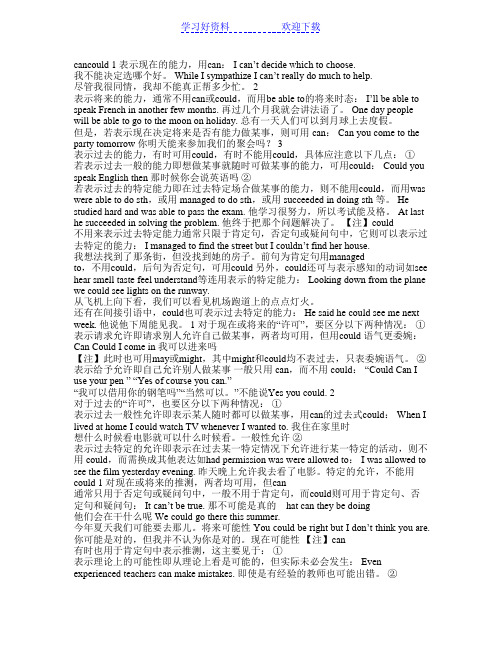
cancould 1 表示现在的能力,用can: I can’t decide which to choose.我不能决定选哪个好。
While I sympathize I can’t really do much to help.尽管我很同情,我却不能真正帮多少忙。
2表示将来的能力,通常不用can或could,而用be able to的将来时态: I’ll be able to speak French in another few months. 再过几个月我就会讲法语了。
One day people will be able to go to the moon on holiday. 总有一天人们可以到月球上去度假。
但是,若表示现在决定将来是否有能力做某事,则可用 can: Can you come to the party tomorrow 你明天能来参加我们的聚会吗? 3表示过去的能力,有时可用could,有时不能用could,具体应注意以下几点:①若表示过去一般的能力即想做某事就随时可做某事的能力,可用could: Could you speak English then 那时候你会说英语吗②若表示过去的特定能力即在过去特定场合做某事的能力,则不能用could,而用was were able to do sth,或用 managed to do sth,或用 succeeded in doing sth 等。
He studied hard and was able to pass the exam. 他学习很努力,所以考试能及格。
At last he succeeded in solving the problem. 他终于把那个问题解决了。
【注】could不用来表示过去特定能力通常只限于肯定句,否定句或疑问句中,它则可以表示过去特定的能力: I managed to find the street but I couldn’t find her house.我想法找到了那条街,但没找到她的房子。
can与could的用法详解及情态动词有关习题

c a n与c o u l d的用法详解及情态动词有关习题Company Document number:WTUT-WT88Y-W8BBGB-BWYTT-19998can与could的用法详解一、表示能力(1)表示现在的能力,用can:My sister can drive. 我妹妹会开车。
Everyone here can speak English. 这儿人人会说英语。
(2)表示将来的能力,通常不用can或could,而用be able to的将来时态:I’ll be able to speak French in another few months. 再过几个月我就会讲法语了。
One day people will be able to go to the moon on holiday. 总有一天人们可以到月球上去度假。
但是,若表示现在决定将来是否有能力做某事,则可用 can:Can you come to the party tomorrow 你明天能来参加我们的聚会吗(3)表示过去的能力,有时可用could,有时不能用could,具体应注意以下几点:①若表示过去一般的能力(即想做某事就随时可做某事的能力),可用could:Could you speak English then 那时候你会说英语吗②若表示过去的特定能力(即在过去特定场合做某事的能力),则不能用could,而用w as (were) able to do sth,或用 managed to do sth,或用 succeeded in doing sth 等。
He studied hard and was able to pass the exam. 他学习很努力,所以考试能及格。
At last he succeeded in solving the problem. 他终于把那个问题解决了。
【注】could 不用来表示过去特定能力通常只限于肯定句,否定句或疑问句中,它则可以表示过去特定的能力:I managed to find the street, but I couldn’t find her house. 我想法找到了那条街,但没找到她的房子。
初中英语语法情态动词can与could用法“三要点”
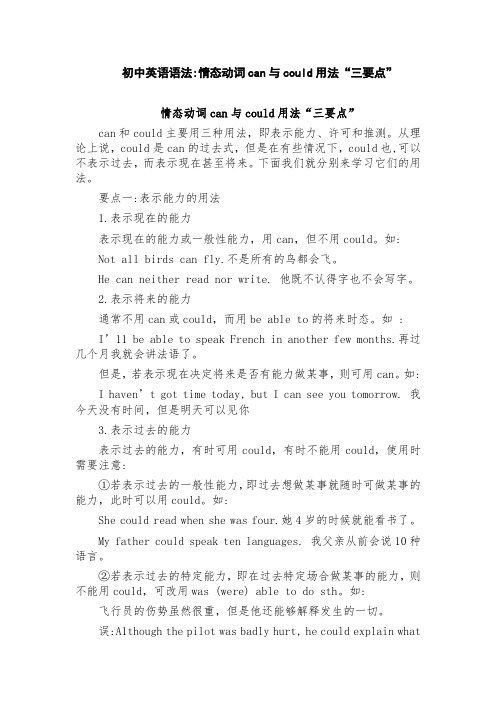
初中英语语法:情态动词can与could用法“三要点”情态动词can与could用法“三要点”can和could主要用三种用法,即表示能力、许可和推测。
从理论上说,could是can的过去式,但是在有些情况下,could也,可以不表示过去,而表示现在甚至将来。
下面我们就分别来学习它们的用法。
要点一:表示能力的用法1.表示现在的能力表示现在的能力或一般性能力,用can,但不用could。
如:Not all birds can fly.不是所有的鸟都会飞。
He can neither read nor write. 他既不认得字也不会写字。
2.表示将来的能力通常不用can或could,而用be able to的将来时态。
如 :I’11 be able to speak French in another few months.再过几个月我就会讲法语了。
但是,若表示现在决定将来是否有能力做某事,则可用can。
如:I haven’t got time today, but I can see you tomorrow. 我今天没有时间,但是明天可以见你3.表示过去的能力表示过去的能力,有时可用could,有时不能用could,使用时需要注意:①若表示过去的一般性能力,即过去想做某事就随时可做某事的能力,此时可以用could。
如:She could read when she was four.她4岁的时候就能看书了。
My father could speak ten languages. 我父亲从前会说10种语言。
②若表示过去的特定能力,即在过去特定场合做某事的能力,则不能用could,可改用was (were) able to do sth。
如:飞行员的伤势虽然很重,但是他还能够解释发生的一切。
误:A1though the pilot was badly hurt, he could explain whathad happened正:Although the pilot was badly hurt, he was able to explain what had happened.句中说的“能够”解释当时所发生的一切,显然是过去特定场合所具有的能力,所以不能用could。
情态动词can和could的用法
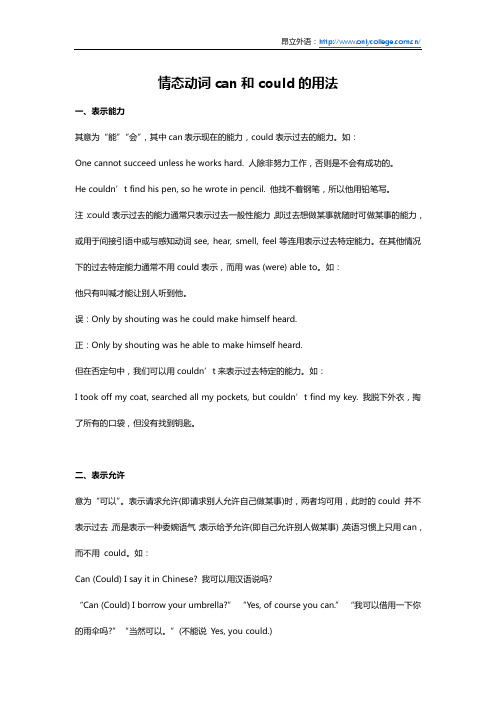
情态动词can和could的用法一、表示能力其意为“能”“会”,其中can表示现在的能力,could表示过去的能力。
如:One cannot succeed unless he works hard. 人除非努力工作,否则是不会有成功的。
He couldn’t find his pen, so he wrote in pencil. 他找不着钢笔,所以他用铅笔写。
注:could表示过去的能力通常只表示过去一般性能力,即过去想做某事就随时可做某事的能力,或用于间接引语中或与感知动词see, hear, smell, feel等连用表示过去特定能力。
在其他情况下的过去特定能力通常不用could表示,而用was (were) able to。
如:他只有叫喊才能让别人听到他。
误:Only by shouting was he could make himself heard.正:Only by shouting was he able to make himself heard.但在否定句中,我们可以用couldn’t来表示过去特定的能力。
如:I took off my coat, searched all my pockets, but couldn’t find my key. 我脱下外衣,掏了所有的口袋,但没有找到钥匙。
二、表示允许意为“可以”。
表示请求允许(即请求别人允许自己做某事)时,两者均可用,此时的could 并不表示过去,而是表示一种委婉语气;表示给予允许(即自己允许别人做某事),英语习惯上只用can,而不用could。
如:Can (Could) I say it in Chinese? 我可以用汉语说吗?“Can (Could) I borrow your umbrella?” “Yes, of course you can.” “我可以借用一下你的雨伞吗?”“当然可以。
”(不能说Yes, you could.)注:以上说的是针对现在或将来情况而言的,若谈的是过去情况,则过去could只用于表示过去一般性允许(即表示某人随时都可以做某事),而不表示特定的允许(即表示在过去某一特定情况下允许进行某一特定的活动),遇此情况需换成其他表达。
语法中的情态动词的用法与区别

语法中的情态动词的用法与区别在英语语法中,情态动词是一类特殊的动词,用于表示说话人对动作、状态或事件的态度、意愿、能力、推测等。
常见的情态动词包括can, could, may, might, shall, should, will, would, must等。
它们有着独特的用法和区别,下面我们将详细讨论。
一、can和could的用法与区别1. can用于表示能力、许可、可能性等,could则表示对过去的推测、委婉的请求或建议等。
例:- He can speak three languages fluently.(他能说三种语言流利。
)- Could you please pass me the salt?(请你递给我盐好吗?)2. can用于表示一般的能力,而could则用于表示过去的具体能力。
例:- When I was young, I could jump very high.(我小时候能跳得很高。
)3. can用于表示可能性、推测,而could则表示可能性更小。
例:- She can be at home.(她可能在家。
)- She could be at home, but I'm not sure.(她可能在家,但我不确定。
)二、may和might的用法与区别1. may用于表示允许、可能性,might则表示较小的可能性。
例:- You may leave the party if you like.(如果你愿意,你可以离开派对。
)- It might rain later.(可能会下雨。
)2. may用于表示请求或征求对方的意见,might则表示更委婉的请求。
例:- May I borrow your pen?(我可以借一下你的笔吗?)- Might I ask for your assistance?(我可以请教你帮忙吗?)三、shall和should的用法与区别1. shall用于表示将来的意愿、命令或承诺,should则表示建议或责任。
can与could的用法详解及情态动词有关习题
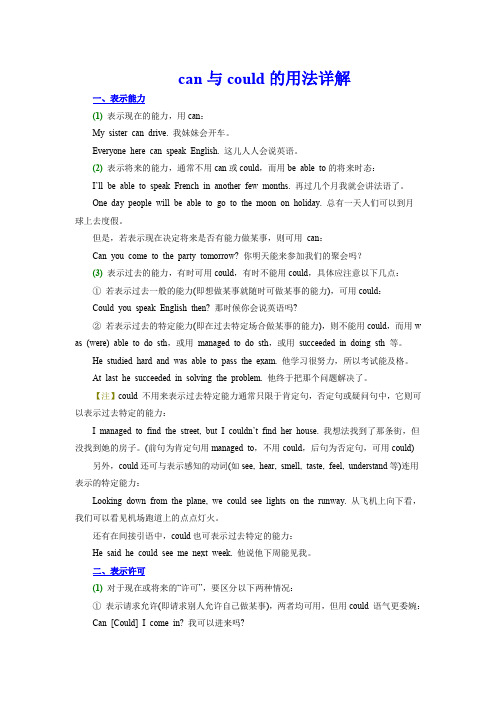
can与could的用法详解一、表示能力(1)表示现在的能力,用can:My sister can drive. 我妹妹会开车。
Everyone here can speak English. 这儿人人会说英语。
(2)表示将来的能力,通常不用can或could,而用be able to的将来时态:I’ll be able to speak French in another few months. 再过几个月我就会讲法语了。
One day people will be able to go to the moon on holiday. 总有一天人们可以到月球上去度假。
但是,若表示现在决定将来是否有能力做某事,则可用can:Can you come to the party tomorrow? 你明天能来参加我们的聚会吗?(3)表示过去的能力,有时可用could,有时不能用could,具体应注意以下几点:①若表示过去一般的能力(即想做某事就随时可做某事的能力),可用could:Could you speak English then? 那时候你会说英语吗?②若表示过去的特定能力(即在过去特定场合做某事的能力),则不能用could,而用w as (were) able to do sth,或用managed to do sth,或用succeeded in doing sth 等。
He studied hard and was able to pass the exam. 他学习很努力,所以考试能及格。
At last he succeeded in solving the problem. 他终于把那个问题解决了。
【注】could 不用来表示过去特定能力通常只限于肯定句,否定句或疑问句中,它则可以表示过去特定的能力:I managed to find the street, but I couldn’t find her house. 我想法找到了那条街,但没找到她的房子。
情态动词can和could的用法区别

情态动词can和could的用法区别一、情态动词can的用法1. 表示能力,意思是:能,会。
如:I can't swim. 我不会游泳。
Can you drive你会开车吗2. 表示客观可能性,意思是:可以,可能。
如:That big cinema can seat 2,000 people.那家大电影院能坐2000人。
He can be very friendly at times.有时他会很友好。
3. 表示允许(和may意思相近),意思是:可以,能够。
如:You can have the book when I have finished it. 书我看完了可以给你。
Can I use your pen 我可以用你的钢笔吗4. 表示惊异、不相信等(用于疑问句、否定句或感叹句中),意思是:会,可能。
如:This can't be true. 这不可能是真的。
Can it be true 这可能是真的吗二、情态动词could的用法1. 表示“能力”或“可能性”,作为can的过去形式。
如:Could you speak English then 那时你能讲英语吗He said he couldn't follow me.他说他跟不上我。
2. 表示惊异、怀疑、不相信等情绪。
如:Who could have taken them 谁会把它们拿走了呢She couldn't have left so soon. 她不可能这么快就走了。
在这种情况下,could和can是可以换用的,用could时口气较缓和,用can时不相信的程度更强一些,两者在时间上没有差别。
3. 比较委婉客气地提出问题或陈述看法。
如:—Could you let me have your passport—Yes, here it is.—看看你的护照好吗—行,这就是。
I could come earlier, if necessary. 如果必要我可以早点来。
情态动词的用法及常见句型总结
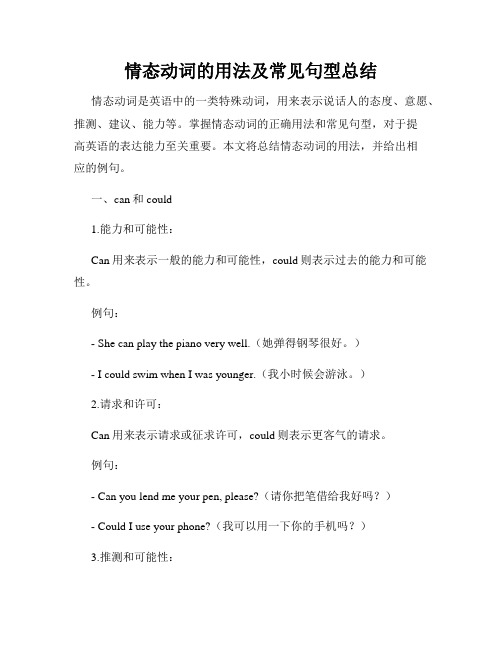
情态动词的用法及常见句型总结情态动词是英语中的一类特殊动词,用来表示说话人的态度、意愿、推测、建议、能力等。
掌握情态动词的正确用法和常见句型,对于提高英语的表达能力至关重要。
本文将总结情态动词的用法,并给出相应的例句。
一、can和could1.能力和可能性:Can用来表示一般的能力和可能性,could则表示过去的能力和可能性。
例句:- She can play the piano very well.(她弹得钢琴很好。
)- I could swim when I was younger.(我小时候会游泳。
)2.请求和许可:Can用来表示请求或征求许可,could则表示更客气的请求。
例句:- Can you lend me your pen, please?(请你把笔借给我好吗?)- Could I use your phone?(我可以用一下你的手机吗?)3.推测和可能性:Can用来表示对现在情况的推测,could则表示对过去或将来情况的推测。
例句:- He can't be at home now.(他现在不可能在家。
)- She could be late for the meeting.(她可能会迟到会议。
)二、may和might1.可能性和许可:May和might都用来表示可能性,表示较大的不确定性,也可用来征求许可。
例句:- It may rain tomorrow.(明天可能会下雨。
)- Might I borrow your umbrella?(我可以借你的伞吗?)2.推测和推测的反问:May和might还可用来表示对现在或将来情况的推测,也可用于反问句。
例句:- He may know the answer.(他可能知道答案。
)- Might I ask you a question?(我可以问你个问题吗?)三、shall和should1.意愿和建议:Shall常用于第一人称,表示意愿、提议或询问行程,should用于其他人称,表示建议或劝告。
初二下情态动词用法
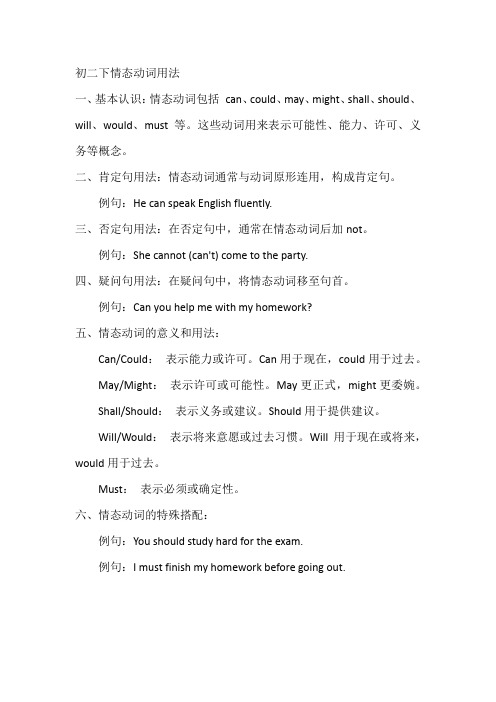
初二下情态动词用法
一、基本认识:情态动词包括can、could、may、might、shall、should、will、would、must等。
这些动词用来表示可能性、能力、许可、义务等概念。
二、肯定句用法:情态动词通常与动词原形连用,构成肯定句。
例句:He can speak English fluently.
三、否定句用法:在否定句中,通常在情态动词后加not。
例句:She cannot (can't) come to the party.
四、疑问句用法:在疑问句中,将情态动词移至句首。
例句:Can you help me with my homework?
五、情态动词的意义和用法:
Can/Could:表示能力或许可。
Can用于现在,could用于过去。
May/Might:表示许可或可能性。
May更正式,might更委婉。
Shall/Should:表示义务或建议。
Should用于提供建议。
Will/Would:表示将来意愿或过去习惯。
Will用于现在或将来,would用于过去。
Must:表示必须或确定性。
六、情态动词的特殊搭配:
例句:You should study hard for the exam.
例句:I must finish my homework before going out.。
情态动词can和could用法详解

情态动词c a n和c o u l d用法详解 Document number【980KGB-6898YT-769T8CB-246UT-18GG08】情态动词can和could 用法详解can 和 could 用法详解1. 表示能力,could 是 can 的过去。
如:Can you speak English 你会说英语吗Could you speak English then 那时候你会说英语吗2. 表示许可,注意以下用法:(1) 对于现在或将来的“许可”,要区分以下两种情况:a. 表示请求允许(即请求别人允许自己做某事),可用 can(=may)或could(=might)(注意:这里的 could 并不表示过去,而是表示现在,只是语气较委婉)。
如:Can [May, Could, Might] I come in 我可以进来吗b. 表示给予允许(即自己允许别人做某事),一般只用 can(=may),而不能用 could 或 might。
如:A: Could [Can] I use your pen 我可以借用你的钢笔吗B: Yes, of course you can. 当然可以。
(注意: 此处不用 Yes,you could)(2) 对于过去的“许可”,也要区分以下两种情况:a. 表示过去一般性允许(即表示某人随时都可以做某事),用 can的过去式(即could)。
如:When I lived at home, I could watch TV whenever I wantedto. 我住在家里时,想什么时候看电影就可以什么时候看 (一般性允许)。
b. 表示过去特定的允许( 即表示在过去某一特定情况下允许进行某一活动),则不用 could, 而需换成其它表达(如:had permission或 was [were] allowed to)。
如:I was allowed to see the film yesterday evening. 昨天晚上允许我去看了电影(特定的允许,所以不能用 could)。
情态动词can(could),may(might)的用法
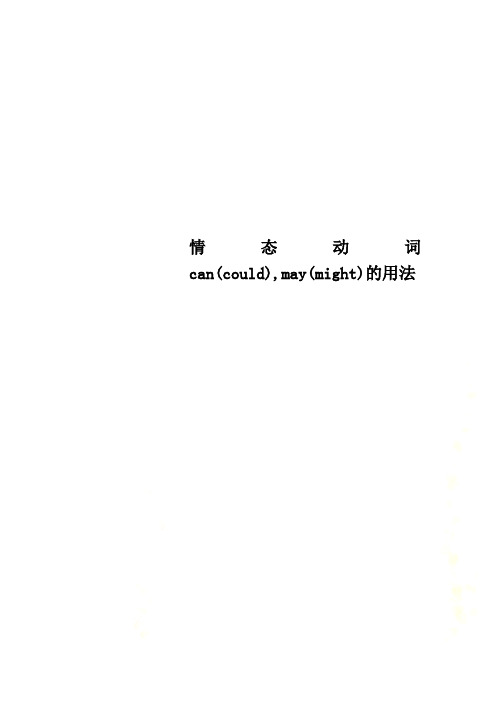
情态动词can(could),may(might)的用法(一)can和could的用法1.表示能力或客观可能性,还可以表示请求和允许。
如:Can you finish this work tonight?你今晚能完成这项工作吗?Can you finish the work in such a short time你能在那么短的时间内完成这项工作吗?Man can not live without air.人离了空气不能活。
What can you do?你能干点什么呢?Can you pass me the books?你能给我递一下书吗?Could you help me,please?请问,你能帮助我吗?— Can I go now? — Yes,you can.—我现在可以走了吗?—你可以。
注意:①could也可表示请求,语气委婉,主要用于疑问句,不可用于肯定句,答语应用can(即could不能用于现在时态的简略答语中)。
如:Could I come to see you tomorrow?我明天能来看您吗?Yes,you can. (否定答语可用No,I'm afraid not.)是的,你可以。
(不,恐怕不行。
)②can表示能力时,还可用be able to代替。
如:I'll not be able to come this afternoon.我今下午不能来。
can 和could 只能用于现在式和过去式两种时态,将来时态用be able to 来表示。
He could help us at all.他完全可以帮助我们。
With the teacher's help,I shall be able to speak English correctly.由于老师的帮助,我将能准确地讲英语。
2. “can”表达推测例:Can the news be true? 这消息会是真的吗?The news can't be true. 这消息不会是真的吧。
情态动词(艺)

情态动词情态动词是表示情态意义的动词, 它表示说话人的语气和情态,它不能单独作谓语,必须与实义动词一起构成谓语,情态动词没有人称和数的变化.如:He can swim in the river .他能在河里游泳.I can swim in the river .我能在河里游泳.They can swim in the river .他们能在河里游泳.英语中常见的情态动词有: can( could ) , may ( might ), must , shall ( should ) ,will ( would ) , need , dare , ought to 下面分别介绍这些情态动词的用法.( 一) 情态动词的基本用法1) can ( could ) 表示能力=be able to , 这时could 为can 的过去时; 能够( 可能), 这时could 不是can 的过去时, 它表示比can 的可能性更小或语气更委婉。
例如:She can sing an English song . (他能唱英文歌。
)Can (Could) you come here at six ? (你能六点中来这儿吗?)2)may ( might ) 可以(表示许可,might表示更委婉);may 的否定式谓:can't(不该)或mustn't (不许)例如:----May I come into the room to see Mr Green ?---- No, you can't. ( mustn't ) He needs to have a good rest .****---Can/Could/May/Might I-------?----Yes, I can/may.3)must 必须;否定式mustn't ,意思为:一定不要;回答must 提问时,否定用needn't , 如:----- Must I start at once ? 我必须立即开始吗?----- No , you needn't . 不,不必。
情态动词can与could用法归纳

cancould 1 表示现在的能力,用can: I can’t decide which to choose.我不能决定选哪个好。
While I sympathize I can’t really do much to help.尽管我很同情,我却不能真正帮多少忙。
2表示将来的能力,通常不用can或could,而用be able to的将来时态: I’ll be able to speak French in another few months. 再过几个月我就会讲法语了。
One day people will be able to go to the moon on holiday. 总有一天人们可以到月球上去度假。
但是,若表示现在决定将来是否有能力做某事,则可用 can: Can you come to the party tomorrow 你明天能来参加我们的聚会吗? 3表示过去的能力,有时可用could,有时不能用could,具体应注意以下几点:①若表示过去一般的能力即想做某事就随时可做某事的能力,可用could: Could you speak English then 那时候你会说英语吗②若表示过去的特定能力即在过去特定场合做某事的能力,则不能用could,而用was were able to do sth,或用 managed to do sth,或用 succeeded in doing sth 等。
He studied hard and was able to pass the exam. 他学习很努力,所以考试能及格。
At last he succeeded in solving the problem. 他终于把那个问题解决了。
【注】could不用来表示过去特定能力通常只限于肯定句,否定句或疑问句中,它则可以表示过去特定的能力: I managed to find the street but I couldn’t find her house.我想法找到了那条街,但没找到她的房子。
情态动词的用法can could may

情态动词的用法can could may 情态动词是英语语法中的一个重要部分,它们能够表达说话人的态度、情感、可能性等。
在众多情态动词中,can、could 和 may 是比较常用且基础的三个,下面我们就来详细探讨一下它们的用法。
一、can 的用法1、表示能力“can”最常见的用法就是表示某人具备做某事的能力。
例如:“I can swim”(我会游泳。
)“He can play the piano”(他会弹钢琴。
)这里的“can”强调的是一种实际拥有的技能或能力。
2、表示可能性“can”也可以用来表示某事有可能发生。
比如:“It can rain tomorrow”(明天可能会下雨。
)这种情况下,“can”所表达的可能性相对较大,但不是绝对的。
3、表示许可当我们请求或给予许可时,也会用到“can”。
例如:“Can I go to the bathroom?”(我可以去洗手间吗?)“You can leave now”(你现在可以走了。
)4、表示否定的推测“can't”则用于表示否定的推测,意思是“不可能”。
例如:“He can't be at home I just saw him in the street”(他不可能在家。
我刚刚在街上看到他了。
)二、could 的用法1、 can 的过去式“could”是“can”的过去式,用于一般过去时,表示过去的能力、可能性或许可。
比如:“I could ride a bike when I was five”(我五岁的时候就能骑自行车了。
)2、表示委婉的请求或建议在现代英语中,“could”比“can”更委婉、更客气。
例如:“Could you please pass me the salt?”(您能把盐递给我吗?)“Could we meet at 8o'clock?”(我们可以八点见面吗?)3、表示可能性“could”也可以表示可能性,但比“can”的可能性要小一些。
英语中的情态动词用法
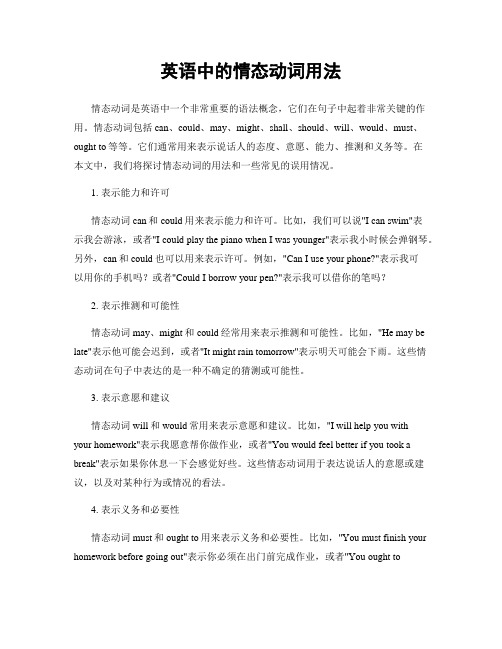
英语中的情态动词用法情态动词是英语中一个非常重要的语法概念,它们在句子中起着非常关键的作用。
情态动词包括can、could、may、might、shall、should、will、would、must、ought to等等。
它们通常用来表示说话人的态度、意愿、能力、推测和义务等。
在本文中,我们将探讨情态动词的用法和一些常见的误用情况。
1. 表示能力和许可情态动词can和could用来表示能力和许可。
比如,我们可以说"I can swim"表示我会游泳,或者"I could play the piano when I was younger"表示我小时候会弹钢琴。
另外,can和could也可以用来表示许可。
例如,"Can I use your phone?"表示我可以用你的手机吗?或者"Could I borrow your pen?"表示我可以借你的笔吗?2. 表示推测和可能性情态动词may、might和could经常用来表示推测和可能性。
比如,"He may be late"表示他可能会迟到,或者"It might rain tomorrow"表示明天可能会下雨。
这些情态动词在句子中表达的是一种不确定的猜测或可能性。
3. 表示意愿和建议情态动词will和would常用来表示意愿和建议。
比如,"I will help you withyour homework"表示我愿意帮你做作业,或者"You would feel better if you took a break"表示如果你休息一下会感觉好些。
这些情态动词用于表达说话人的意愿或建议,以及对某种行为或情况的看法。
4. 表示义务和必要性情态动词must和ought to用来表示义务和必要性。
could can的用法
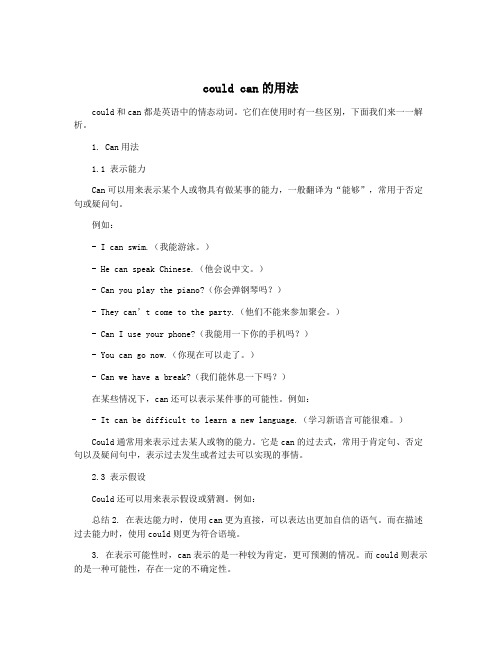
could can的用法could和can都是英语中的情态动词。
它们在使用时有一些区别,下面我们来一一解析。
1. Can用法1.1 表示能力Can可以用来表示某个人或物具有做某事的能力,一般翻译为“能够”,常用于否定句或疑问句。
例如:- I can swim.(我能游泳。
)- He can speak Chinese.(他会说中文。
)- Can you play the piano?(你会弹钢琴吗?)- They can’t come to the party.(他们不能来参加聚会。
)- Can I use your phone?(我能用一下你的手机吗?)- You can go now.(你现在可以走了。
)- Can we have a break?(我们能休息一下吗?)在某些情况下,can还可以表示某件事的可能性。
例如:- It can be difficult to learn a new language.(学习新语言可能很难。
)Could通常用来表示过去某人或物的能力。
它是can的过去式,常用于肯定句、否定句以及疑问句中,表示过去发生或者过去可以实现的事情。
2.3 表示假设Could还可以用来表示假设或猜测。
例如:总结2. 在表达能力时,使用can更为直接,可以表达出更加自信的语气。
而在描述过去能力时,使用could则更为符合语境。
3. 在表示可能性时,can表示的是一种较为肯定,更可预测的情况。
而could则表示的是一种可能性,存在一定的不确定性。
4. 在使用can和could时,注意区分它们的语境,避免语法错误和表达不当所带来的误解。
掌握can和could的使用方法,能够提高我们的英语表达水平,也能够为我们在实际交流中带来更好的效果。
我们还需要不断地扩充自己的词汇量,了解更多的语法和用法,才能够更加熟练地使用英语,表达自己的想法和意见。
除了can和could,情态动词还包括might、may、must、shall、should、will、would等等。
日常生活情态动词用法总结
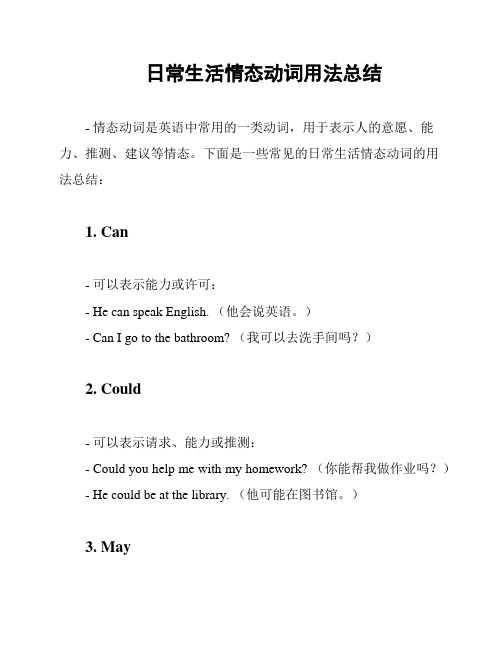
日常生活情态动词用法总结- 情态动词是英语中常用的一类动词,用于表示人的意愿、能力、推测、建议等情态。
下面是一些常见的日常生活情态动词的用法总结:1. Can- 可以表示能力或许可:- He can speak English. (他会说英语。
)- Can I go to the bathroom? (我可以去洗手间吗?)2. Could- 可以表示请求、能力或推测:- Could you help me with my homework? (你能帮我做作业吗?)- He could be at the library. (他可能在图书馆。
)3. May- 可以表示许可或推测:- May I borrow your pen? (我可以借用你的钢笔吗?)- He may arrive late. (他可能会迟到。
)4. Might- 可以表示或许的推测或请求许可:- I might go to the party tonight. (我今晚可能会去派对。
)5. Must- 可以表示必须或推测:- You must study for the exam. (你必须为考试研究。
)- It must be cold outside. (外面一定很冷。
)6. Should- 可以表示建议或期望:- You should eat more vegetables. (你应该多吃蔬菜。
)- He should be here by now. (他现在应该在这里。
)7. Ought to- 可以表示应该或期望:- You ought to listen to your parents. (你应该听父母的话。
)- He ought to be more careful. (他应该更加小心。
)8. Would- 可以表示客气的请求、愿望或假设:- Would you like some tea? (你想喝点茶吗?)- I would like to travel to Japan. (我想去日本旅行。
情态动词+被动语态
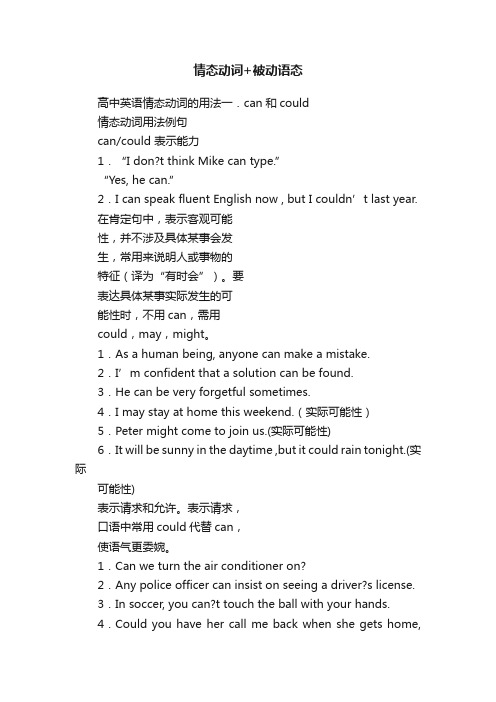
情态动词+被动语态高中英语情态动词的用法一.can和could情态动词用法例句can/could 表示能力1.“I don?t think Mike can type.”“Yes, he can.”2.I can speak fluent English now , but I couldn’t last year.在肯定句中,表示客观可能性,并不涉及具体某事会发生,常用来说明人或事物的特征(译为“有时会”)。
要表达具体某事实际发生的可能性时,不用can,需用could,may,might。
1.As a human being, anyone can make a mistake.2.I’m confident that a solution can be found.3.He can be very forgetful sometimes.4.I may stay at home this weekend.(实际可能性)5.Peter might come to join us.(实际可能性)6.It will be sunny in the daytime ,but it could rain tonight.(实际可能性)表示请求和允许。
表示请求,口语中常用could代替can,使语气更委婉。
1.Can we turn the air conditioner on?2.Any police officer can insist on seeing a driver?s license.3.In soccer, you can?t touch the ball with your hands.4.Could you have her call me back when she gets home,please?5.I wonder if I could just ask you to sign this.表示对现在的动作或状态进行主观的猜测,主要用在否定句和疑问句中。
情态动词can与could用法归纳
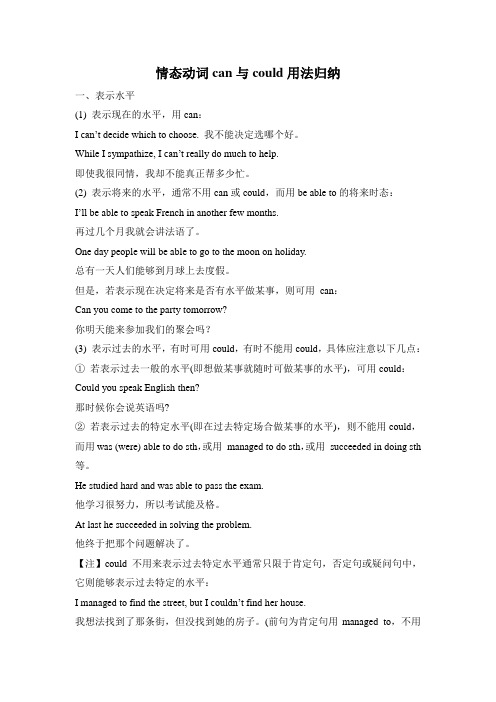
情态动词can与could用法归纳一、表示水平(1) 表示现在的水平,用can:I can’t decide which to choose. 我不能决定选哪个好。
While I sympathize, I can’t really do much to help.即使我很同情,我却不能真正帮多少忙。
(2) 表示将来的水平,通常不用can或could,而用be able to的将来时态:I’ll be able to speak French in another few months.再过几个月我就会讲法语了。
One day people will be able to go to the moon on holiday.总有一天人们能够到月球上去度假。
但是,若表示现在决定将来是否有水平做某事,则可用can:Can you come to the party tomorrow?你明天能来参加我们的聚会吗?(3) 表示过去的水平,有时可用could,有时不能用could,具体应注意以下几点:①若表示过去一般的水平(即想做某事就随时可做某事的水平),可用could:Could you speak English then?那时候你会说英语吗?②若表示过去的特定水平(即在过去特定场合做某事的水平),则不能用could,而用was (were) able to do sth,或用managed to do sth,或用succeeded in doing sth 等。
He studied hard and was able to pass the exam.他学习很努力,所以考试能及格。
At last he succeeded in solving the problem.他终于把那个问题解决了。
【注】could 不用来表示过去特定水平通常只限于肯定句,否定句或疑问句中,它则能够表示过去特定的水平:I managed to find the street, but I couldn’t find her house.我想法找到了那条街,但没找到她的房子。
- 1、下载文档前请自行甄别文档内容的完整性,平台不提供额外的编辑、内容补充、找答案等附加服务。
- 2、"仅部分预览"的文档,不可在线预览部分如存在完整性等问题,可反馈申请退款(可完整预览的文档不适用该条件!)。
- 3、如文档侵犯您的权益,请联系客服反馈,我们会尽快为您处理(人工客服工作时间:9:00-18:30)。
英语中情态动词can和could的用法及例句I.情态动词can可以用来:
1.表示“能够”:
Two eyes can see more than one.
两只眼睛比一只眼睛看得清楚。
(谚)
Can you say this in English?
你能用英文表达这个意思吗?
I’m sorry I can’t help you.
戏不起我没有能力帮助你。
2.表示“可能”,“可以”:
You can sit here.
你可以坐这里。
We can come over to fetch you.
我们可以过来接你。
Can I come in?
我可以进来吗?
3.(用在疑问及否定句中)表示惊异不可能等(后面有时可跟完成及进行形式):
She can’t be serious.
她不可能是当真的。
How call you be so silly?
你怎么这样傻?
Where can he have gone?
他能到哪里去了呢?
What can she be doing now?
她现在能在干什么呢?
II.情态动词could可以用来表示:
1)能够:
Nobody conld answer that question.
没人能回答那个问题。
It was so dark,we couldn’t see anything.
天那样黑我们什么也看不见。
2)可能,可以:
He said he couldn’t come.
他说他不能来。
I said we could go by boat.
我说我们可以坐船去。
2.可以用来代替can,比较委婉地提出请求用法等(a)或是表示惊异不相信等(b):
a.Could you do me a favor?
你能帮我一个忙吗?
We could send the parcel by air mail.
这包裹可以航空寄去。
b.How could he be so rude?
他怎么这样粗鲁无礼?
They couldn’t have left so soon.
他们不可能走得这么早。
此外could还可用在条件句中,表示假想的情况:I would help you if I could.
我要是能够是会帮助你的。
If you tried you could do the work.
如果你试试,你是可以做这工作的。
